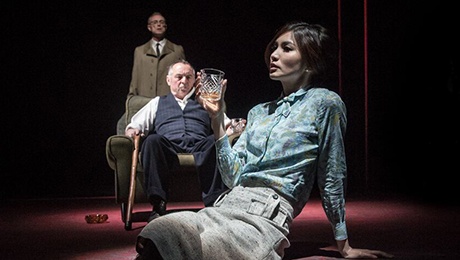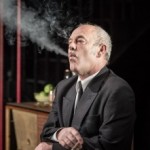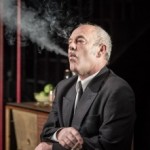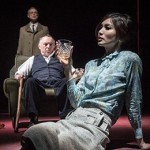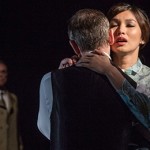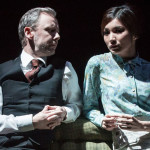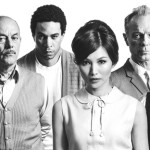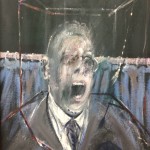“Well, look at it this way. How can the unknown merit reverence? In other words, how can you revere that of which you’re ignorant? ” – Lenny in The Homecoming
2015 marked half a century since Pinter‘s classic drama The Homecoming was first performed, so Jamie Lloyd‘s company revived it – and with it the spirit of the 60s, music and all. The house in which the action takes place is described only as old and being in North London, but here it conveys much of the sleazy underbelly of 60s life, making it in many ways the perfect location for a Pinter play.
Uneasy ambiguity is what makes Pinter a great playwright, though his work will always polarise audiences for the same reason. By rights the action should feel more claustrophobic than it does, though as a backdrop for menacing power games and territorial conflicts you can hardly imagine a more fitting ambience. The mannered pauses become aggressive statements of intent, a subtle and subliminal form of communication every bit as effective as long monologues, far more than merely marking time and territory. As John Lahr puts it:
“The Homecoming changed my life. Before the play I thought words were just vessels of meaning; after it I saw them as weapons of defence. Before, I thought theatre was about the spoken; after, I understood the eloquence of the unspoken. The position of a chair, the length of a pause, the choice of a gesture, I realised, could convey volumes.”
Talking of which, the old man’s chair dominates the downstage area, while stage left includes a sideboard and old stereo, plus a few chairs. One bare bulb hangs above the stage, leaving shadows and darkness beyond. Downstage left there are staircases up and down, plus a passageway. However, the greatest focal point is the one door, upstage centre. The stage is constructed within the confines of a red metal framework that amplifies the door and all entrances and exits.
This geometric framework reminded me, as doubtless it was meant to, of the framed boxes in which characters in Francis Bacon‘s paintings are contained – on which subject I said the following in my blog about Bacon:
The subjects of Bacon’s paintings are frequently contained within a framework, as if caged to protect us; some of the frames are almost like a boxing ring. The characters are isolated, warped, beyond help or assistance within their cage. Their dark shapes lurk in the shadows, many twisted and tormented, suffering some tortured agony of their own devising.
And so it is with Pinter’s characters – at time they almost share the blurred profile of Bacon’s characters as they struggle with their inner angst. The Homecoming is very typical in that respect: what the characters say is often trivial or incidental; like the proverbial iceberg the vast bulk of their true feelings remain hidden. Lloyd exposes the inner emotions of each character using the motif of a shift into red light and menacing sound before the reality snaps back into focus.
Nowhere is this done more effectively than where Gary Kemp‘s Teddy stands anguished, his fist in his mouth – almost a perfect Bacon pose depicting inner pain and suffering. No surprise then that in the rundown of 1965 within the programme, who should be grinning back at me than Francis Bacon?
In its first half, the play is almost a warped London retelling of Cat On A Hot Tin Roof, where Big Daddy has morphed and shrunk into the guise of a small but gutsy London patriarch called Max, played with vicious intensity by Ron Cook. Max is full of tall tales his past achievements, but the only point of control left in his life is cooking for his family, in the absence of his late wife.
Max’s frustration boils over into violence once, but is never referred to again. He is the dying embers of a regime, and the competition is for who takes the reins of power from Max – much as Big Daddy is dying of cancer and needs a new patriarch to maintain the family tradition, of which more anon.
Max’s brother Sam (Keith Allen) has no such pretensions. He minces on stage in his chauffeur’s uniform, reminding me of Ian Dury‘s song My Old Man – except in this case, Sam has no wife and no children, though Max’s pointed inference of Sam’s homosexuality is ignored. He retorts with reminders that Max’s wife Jessie was not perfect either, detracting from the rosy-tinted esteem in which she is held.
Max wields power through knowing the pressure points and the history of each member of his family, and is not afraid to use harsh language to demonstrate his point. However, middle son Lenny (John Simm) ignores the taunts. Lenny, pimp by trade and sharp geezer, sees himself as the next in line; he is not afraid to patronise or ridicule anyone who gets in the way – though younger brother Joey (John MacMillan), a boxer and the least capable brother, is not deemed a threat but remains family, his only real hope being his ability to fight – though unlike Max, not with the family.
However, the unexpected arrival of elder brother, Teddy (Kemp) with wife Ruth (Gemma Chan) after an absence of 6 years in academia in the USA, presents a new dynamic, affecting the balance of power. It draws deep-seated resentment and hearty welcomes, almost in the same sentence.
While Teddy fills the voids and behaves like mother, running about doing chores, it is Ruth who is the real challenge, beginning by giving Lenny a taste of his own medicine – leaving him mocking the injustice. This is just the first taste of Ruth’s sharper side, and we see more in the second half. Most telling is when she runs halfway downstairs, realises there is a roomful of people, then completes the journey slowly, emphasising her allure. As the only female she represents many things to the men, but as time goes on holds her husband in complete contempt.
Despite his status as the oldest son, and his qualifications, Teddy fails the power game such that he is bullied by the family and forced to accept their assertion that Ruth be prostituted to earn money for her keep. Perhaps they want Ruth to show weakness and beg for mercy, but that is not her style. She turns the tables by issuing her own demands and forces the men to capitulate. The spotlight fades on a tranquil Ruth, for she knows she has inherited the mantle of matriarch in the family by winning the power battle – and this is a greater prize than her feeble husband and even than her children.
With a star-studded cast this is a finely nuanced production that rarely if ever loses its grip on the audience. If there is any weak link, it is surely Kemp, whose character might be ineffectual but who also fails to communicate his inability to fight back against the mind games. However, Chan outshines all competition, literally and metaphorically – in spite of the deft skill of Cook and Simm. She comes on with the poise of an air hostess and seemingly gains dignity and strength throughout – even when first Lenny and then Joey thrust themselves upon her, as if she wants to mock Max’s initial taunts of her as a cheap whore.
I feel sorry for MacMillan, clearly a capable actor who has been directed to appear less as a simpleton and more as a victim of a grotesque mental illness, a child in an adult’s body. The impact of MacMillan’s brain dead speech patterns slightly detracted from the overall effect, but not by too much. But even then, the virile Joey is more of a man than Teddy will ever be.
The Homecoming remains a powerful and vibrant drama 50 years on, and no less open to interpretation, which surely is the sign of a great play, one worthy of revival. A night at the Trafalgar Studios reminds me just how vital Pinter is to the canon of English drama.

